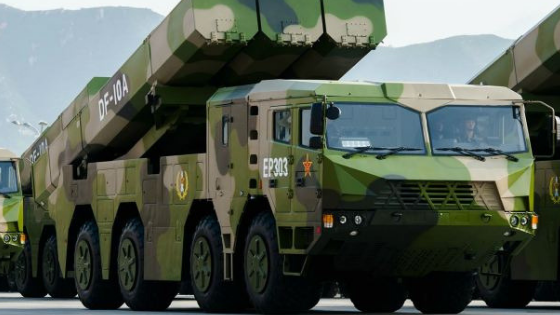“Last month, Chinese Rear Adm. Lou Yuan told an audience in Shenzhen that sinking a pair of U.S. aircraft carriers would settle issues of sovereignty in the South China Sea. What the United States fears the most is taking casualties,” he said, noting that 5,000 servicemembers would die on each sunken carrier.
[Seth Robson | January 11, 2019 | STARS AND STRIPES ]
China has mobilized a missile designed to target American warships following a patrol by a Navy destroyer through disputed waters in the South China Sea, according to a state-run broadcaster.
“China’s far-reaching, anti-ship ballistic missile the DF-26 has been mobilized to Northwest China’s plateau and desert areas,” China’s Global Times newspaper reported Wednesday, citing China Central Television.
The mobilization followed a patrol by the guided-missile destroyer USS McCampbell near the Paracel Islands, which the newspaper said “trespassed into China’s territorial waters” in the South China Sea on Monday.
The missile, which experts have called the “Guam killer,” can strike targets 3,400 miles away, placing Andersen Air Force Base within range.
“McCampbell sailed within 12 nautical miles of the Paracel Islands to challenge excessive maritime claims and preserve access to the waterways as governed by international law,” U.S. Pacific Fleet spokeswoman Lt. j.g. Rachel McMarr said in a statement forwarded by 7th Fleet on Friday.
“U.S. Forces operate in the Indo-Pacific region on a daily basis, including in the South China Sea,” she said. “All operations are designed in accordance with international law and demonstrate that the United States will fly, sail and operate wherever international law allows. That is true in the South China Sea as in other places around the globe.”
The Navy will continue to conduct regular, routine freedom-of-navigation operations, she said. The patrols “are not about any one country, nor are they about making political statements.”
The Global Times quoted an unnamed Beijing-based military expert saying that the DF-26 missile mobilization “is a good reminder that China is capable of safeguarding its territory.”
Last month, Chinese Rear Adm. Lou Yuan told an audience in Shenzhen that sinking a pair of U.S. aircraft carriers would settle issues of sovereignty in the South China Sea.
“What the United States fears the most is taking casualties,” he said, noting that 5,000 servicemembers would die on each sunken carrier.
The DF-26 would place carrier task forces at considerable peril if it could accurately target them, according to Paul Buchanan, an American security analyst based in Auckland, New Zealand.
“There’s been no testing observed by outsiders, so the U.S. Navy is unclear if it can go operational anytime soon,” he said in a phone interview Friday.
Freedom-of-navigation exercises, including those that involve other nations, won’t change what’s going on in the South China Sea, Buchanan added.
“The horse has bolted,” he said. “The days of confronting the Chinese are long gone. It should have been done 10 years ago. Island-building has enabled [China] to claim possession of the South China Sea.”
Chinese efforts to claim the South China Sea threaten international law and U.S. interests, foreign policy experts Zack Cooper and Gregory Poling wrote in an article published this week by Foreign Policy magazine.
“China now has three large air and naval bases in the Spratlys and another in the Paracels, along with numerous smaller military outposts. These facilities support a round-the-clock Chinese air, naval, coast guard, and paramilitary presence throughout the South China Sea,” they wrote.
The Spratlys and Paracels are small island chains claimed by multiple nations bordering the South China Sea.
If the South China Sea becomes a Chinese lake in which the Navy can sail but smaller states are unable to pursue their rights, “Beijing will have seized a maritime entitlement five times larger than permitted by … international law, carving out an illegitimate sphere of influence,” they wrote.
Rotating U.S. forces through Philippine military bases under the 2014 Enhanced Defense Cooperation Agreement would help address challenges posed by nearby Chinese bases.
However, plans to do that have been sidetracked under maverick Philippine President Rodrigo Duterte, and it’s unclear if and when that will happen, the article said.
[email protected]
Twitter: @SethRobson1













